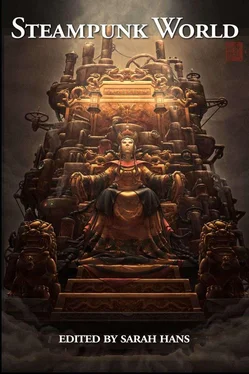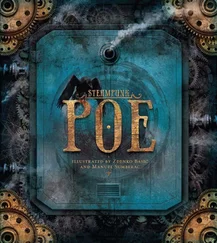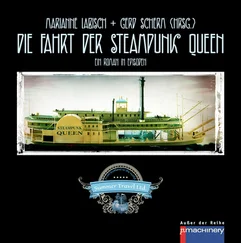A crack of bone; a surprising lack of blood.
He hangs slack between rattan hands, pale and panting.
“Monsieur.” Aunrampha pours herself another cup. “It is true there are consequences to any act of provocation. Bringing you to trial and tribunal is not an option. In the open your punishment would be no graver than if you’d committed petty theft, for you are of France. But here that will not suffice; here I am your judge, and I hope you’re as dedicated to the virtue of justice as I am.”
Aunrampha has the Farangset men disposed of afterward. Their bodies will be buried deep, their belongings incinerated. Clothes stripped, faces mutilated beyond recognition. She does not take chances.
When Aunrampha returns, she spreads Anna Leonowens’ letters out, holds down the corners with inkwells. “This isn’t one of Anna’s silly correspondences. There’s more than just the usual that she doesn’t want intercepted by palace staff.”
“What is the usual?”
“Tales of how His Majesty whips palace slaves raw, of how he summons little girls to his bed.”
Ging flinches. “Is any of it true?”
“He’s talked of emancipating the slaves, to the collective displeasure of his ministers. As for the girls… if he did that, I would know. I’d be obliged to silence, but I would know.” Aunrampha passes a hand over her face, rubbing at her eyes. “Anna’s petty retaliation for his refusal to grant her more power than she already wields. I read an earlier letter that said His Majesty wanted to make her a concubine. She, being a virtuous woman under the grace of Yesu Christ, naturally spurned him. Doubtless that makes her quite the sensation among friends and family in Angrit.”
“What is the point?”
“Convincing her superiors and social circles that we’re barbarians living under the reign of an insane, lecherous tyrant. It’s a fable that has its uses, for them.” Aunrampha pats out the creases on the letters. “Read these.”
Ging does, falteringly, straining to decipher the twisting spidery script. “But this is—”
“A confirmation that the Angrit empire is no friend of ours and will leave us to Farangset mercy should it come to conflict. That Farangset, once they’re done with Yuan and Kampucha, will turn their gaze to us. The assassination attempt was a prelude, of sorts, to destabilize His Majesty’s reign. It’ll be some time in coming.” Aunrampha rubs her hand against the tight skirt of her gipao. “In five years or twenty. Nevertheless it will come.”
The hour has grown much too late, lit with lamplight that jaundices packed earth and pavement. They walk arm in arm down the dock where Ging’s wheelboat is moored. On her knees and weary for no real reason, Ging pours oil into one of the boat’s receptacles and adds a precise amount of solution. Her own adapted formula mixing her teacher’s and that of Jeen firecrackers. It hisses, flaring blue; boat actuators whir into motion.
An amber flicker in the distance, against a night as deep as it is damp. It takes too long for them to understand what it is.
When they arrive the workshop is smoke and ruin, scorched roof-boards floating in the waters, pieces of the veranda trapped among duckweeds and upriver refuse. Shards of pottery and glass on the steps leading to the house, stains of Ging’s pastes and pigments on the wood.
They find Nok by a window.
She must have tried to escape. Blackened fingers curl over the sill, caught under a fallen beam. The rest of her is hidden, but from a scrap of bright orange pha-nung it can be no one else.
“I only thought," Ging says distantly, staring at that hand, “to have someone look after the shop. That’s all. She was going to visit her temple siblings.”
The first drops of a late-summer rain. Where they touch the wreck of her house the wood sizzles and cracks. Each of Ging’s muscles tenses; she wants to reach out, to be in motion, to do what she does not know. Aunrampha is holding her steady, but she isn’t shaking, isn’t collapsing. She feels nothing at all, as if her heart has guttered out.
Footsteps on wet mulch. The snap and rustle of a parasol opening. From beneath its shade Anna Leonowens peers at them. “An unfortunate night.”
Ging looks at the Angrit, a heat unfurling in her that turns to ice. “You murdered a child.”
“Did I? An odd conclusion to make, on little evidence save that I’ve passed by. If a child is dead, my condolences. Lady Panthapiyot, how interesting to see you about at this hour. Your mother would be… put out, let alone to hear that you’re attired and painted like a Chinese whore. So loosely are girls raised in this country. Spare the rod, spoil the child—you could’ve benefited from a boarding school, a Christian education.”
“Leonowens.” Aunrampha steps between Ging and Anna. “You are not untouchable.”
“Siamese as a lot are ungrateful. Your kingdom, such as it is, stands sovereign on the sufferance of Britain.” The woman shrugs, a farang gesture. “I’ll leave you to your matter. I suppose there’ll be cremation and much heathen noise made by bald men in orange robes.”
She lifts her skirts slightly, her boots squelching on puddles. The parasol she hands to a gaunt yellow-headed man. Her carriage bears the emblem of the Angrit embassy. It rumbles away under the crack of a whip, a spray of mud and rainwater in its wake.
“I'll have justice," Ging says to the quiet that carriage and governess have left behind. The rain tastes of bitter salt, as though it’s passed through ashes.
“Ging, I can’t remove her. Not right now.”
She takes a breath and grips Aunrampha’s hand, treasuring the solidity and warmth of it, and brings it to her chest. “I don’t mean that; I don’t mean her. She’s nothing, less than nothing. I’m making the automata too slowly. Give me a factory and I'll turn out hundreds in a year. Find me machines for welding and molding and I'll make them from the hardest steel. Pick me clockwork artisans you trust and I'll create little ones with gunpowder hearts.”
Later Ging climbs what remains of the stairs, her feet light on boards gone to cinders. She surveys the smashed pestle and pots, the broken distillers, the burnt papers—though none of them would contain the formulae that live only in her head. Aunrampha is close at her back, a touch always on her, and that is what keeps her from exhaling screams. They do not talk.
They shift the fallen beam away and loosen Nok’s blackened limbs as best they can. Burned skin sloughs off her and the smell is unthinkable, the contortion of her impossible. She is almost weightless when Ging takes her up, swaddling her in a cotton sheet that has survived the arson.
At dawn, caked in soot and smelling of filth, they find a phiksuni at a small temple. She does not ask questions. The funeral is attended by two.
Ging is twenty-nine when malaria claims His Majesty. Before the year’s end Prince Chulalongkorn has assumed the throne. Anna Leonowens is long gone, home in Angrit no worse for the wear. Her dismissal is not public knowledge and she spreads fiction of an amiable parting with the royal household.
Ging is thirty-four when Kampucha ceases to be a kingdom.
It comes as no surprise. The Yuan by that point isn’t much of a sovereignty—has not been for a long time. She hears some exult that Siam’s enemies fall one by one: Yuan, Phma, Kampucha finally. Aunrampha’s brows knit tighter every day. They have moments together but those become fewer, briefer, and Ging does not sleep most nights.
There are two factories.
They have made a thousand and two hundred dolls, and nearly twice as many bombers: crude clockwork dolls, each bearing an explosive charge. Five of them are enough to sink a ship.
Читать дальше












